In the competitive landscape of digital marketing, email remains one of the most effective channels for engaging with your audience, nurturing leads, and driving conversions. However, choosing the right email marketing tool is crucial to maximize your campaign’s effectiveness. While there are numerous options available, identifying the best tool that aligns with your business needs can be daunting. This comprehensive guide explores some of the top email marketing tools, highlighting their unique features, pricing, and suitability for different types of users. Additionally, we’ll uncover five “hidden gems” strategies that are not widely recognized but can significantly enhance your email marketing effectiveness.
Key Facts
- The best email marketing tools offer advanced automation, segmentation, and personalization features, enabling businesses to create highly targeted and engaging campaigns.
- These tools cater to various business sizes and industries, with pricing plans that scale according to the number of contacts and features needed, ensuring that you can find a solution that fits your budget and requirements.
- Choosing the right email marketing tool depends on specific requirements such as ease of use, integrations, customer support, and budget. It’s essential to evaluate each option carefully to determine which one aligns best with your business goals and target audience.
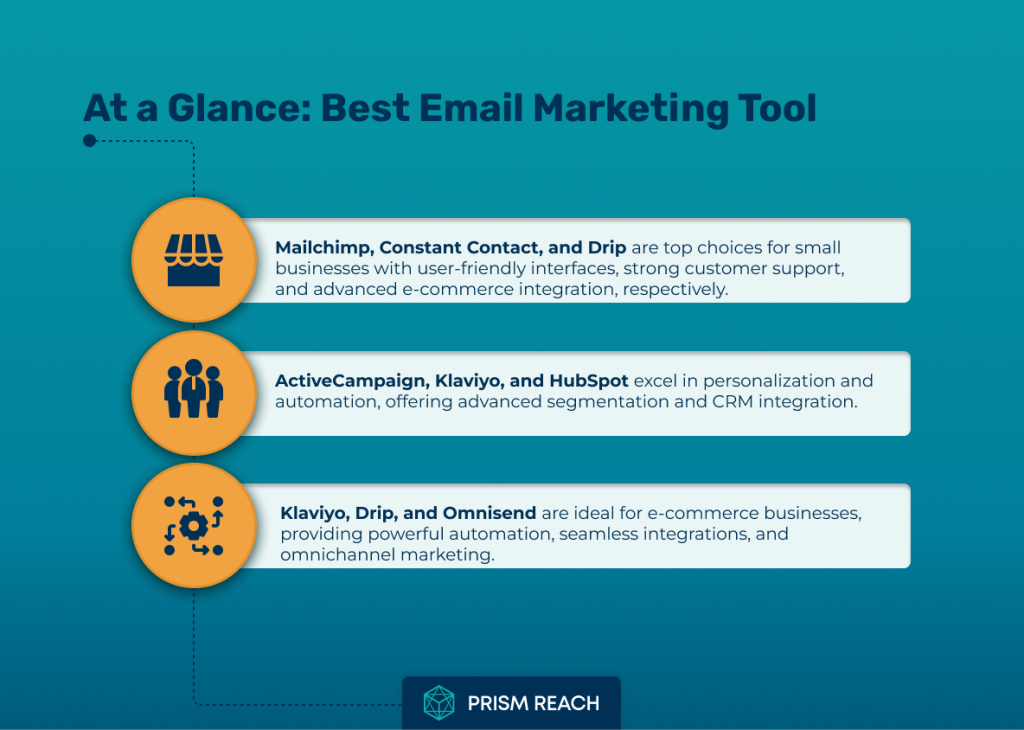
Hidden Gems: 5 Strategies to Enhance Your Email Marketing
While selecting the right email marketing tool is fundamental, employing innovative strategies can significantly elevate your campaign’s effectiveness. Here are five “hidden gems” strategies that can transform your email marketing efforts:
1. Leverage Interactive Email Elements
Incorporating interactive elements such as polls, quizzes, and embedded videos can vastly improve engagement rates. Research shows that interactive emails can lead to a 300% increase in click rates. This strategy is often overlooked but can transform static emails into engaging experiences that captivate recipients.
2. Utilize AI for Personalization at Scale
Many marketers are beginning to leverage generative AI tools to create highly personalized email content. By analyzing user behavior and past interactions, AI can suggest tailored content and product recommendations. This approach not only saves time but also enhances the relevance of emails, leading to higher engagement and conversion rates.
3. Implement Behavioral Trigger Emails
Setting up automated emails based on specific user actions (like cart abandonment or browsing history) can significantly boost engagement. Tools like Moosend allow for multiple triggers, enabling tailored follow-ups that resonate with user behavior, improving the chances of conversion.
4. Incorporate User-Generated Content (UGC)
Encouraging customers to share their experiences and featuring UGC in your campaigns can enhance authenticity and trust. UGC acts as social proof and has been shown to increase engagement, as it reflects real-life experiences that potential customers can relate to.
5. Use Gamification Techniques
Adding gamification elements such as scratch cards or spin-to-win features within emails can make the experience more enjoyable for recipients. This strategy not only increases engagement but also encourages users to interact with the content more deeply.
Upgrade Your Email Marketing with AI Personalization!
Top Email Marketing Tools
Mailchimp
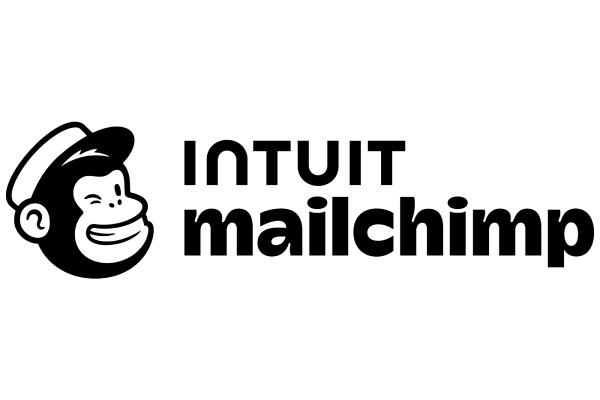
Pros:
✅ Affordable for startups: Attracts small businesses. subscribers.
✅ Visual Email Editor: Easy, drag-and-drop functionality.
✅ Free Plan Available: Suitable for budget constraints.
✅ Marketing Automation: Enhances campaign effectiveness.
✅ Advanced Segmentation: Personalizes subscriber content.
Cons:
❌ Costly as Contacts Increase: Pricing scales with growth.
❌ Complex Automation Setup: Can be challenging to navigate.
Constant Contact

Pros:
✅ User-Friendly Interface: Ideal for beginners.
✅ High Deliverability Rates: Ensures emails reach inboxes.
✅ Responsive Customer Support: Quick and helpful assistance.
✅ Wide Template Selection: Customizable, engaging content.
✅ Extensive Integrations: Connects with major platforms.
Cons:
❌ Higher Pricing: More expensive than competitors.
❌ Limited Automation: Lacks advanced features.
Drip
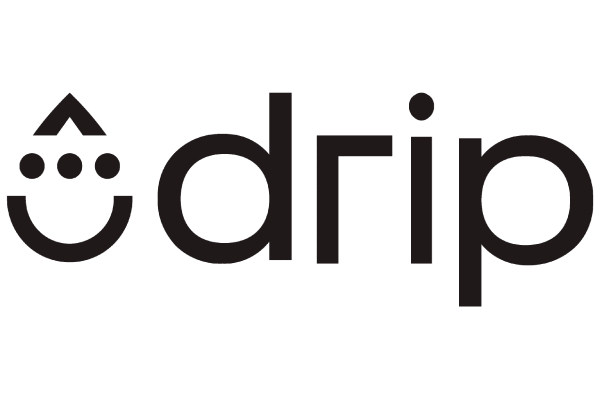
Pros:
✅ Advanced Segmentation: Targets using behavior and purchase history.
✅ Powerful Automation: Drives sales and engagement.
✅ E-commerce Integrations: Works with Shopify, WooCommerce, Magento.
✅ Customizable Templates: Wide range for effective campaigns.
✅ Visual Workflow Builder: Simplifies campaign management.
Cons:
❌ Steep Learning Curve: Complex features can overwhelm.
❌ Pricing Scales with Contacts: Gets costly for large lists.
ActiveCampaign

Pros:
✅ Visual Automation Builder: Easily create complex workflows.
✅ Advanced Segmentation: Personalizes based on diverse criteria.
✅ Dynamic Content: Tailors emails to subscriber data.
✅ Extensive App Integrations: Enhances marketing stack connectivity.
✅ Powerful Personalization: Increases engagement and conversions.
Cons:
❌ Steep Learning Curve: Complex features can overwhelm.
❌ Higher Pricing: May strain smaller budgets.
Klaviyo
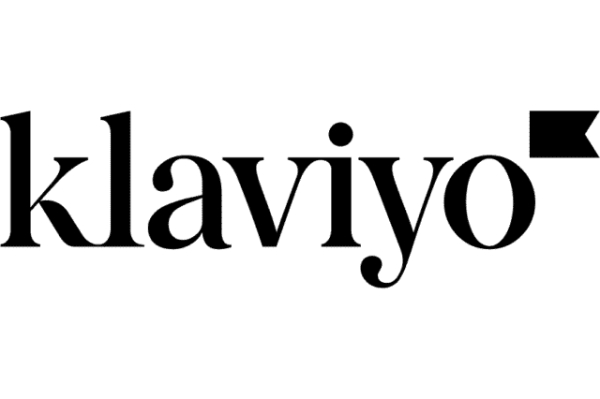
Pros:
✅ E-commerce Specific Tools: Tailored for online retail.
✅ Advanced Segmentation: Targets based on detailed customer data.
✅ Powerful Automation: Pre-built for common e-commerce scenarios.
✅ Seamless Platform Integration: Syncs with Shopify, Magento, WooCommerce.
✅ Customizable Email Templates: Easy drag-and-drop editing.
Cons:
❌ Costly for Large Lists: Pricing based on contact numbers.
❌ Steep Learning Curve: Setup for automations can be complex.
HubSpot
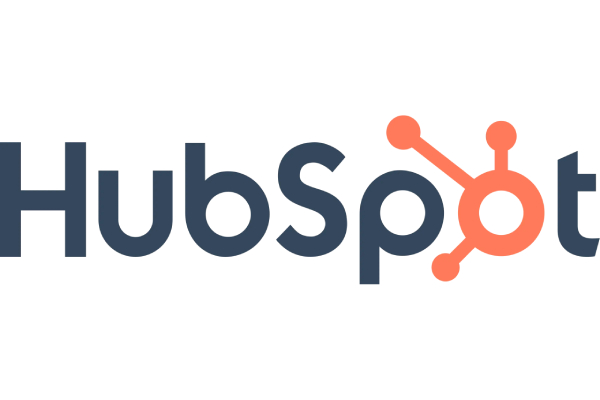
Pros:
✅ Integrated CRM: Enhances customer relationship management.
✅ Comprehensive Automation: Creates complex, behavior-based workflows.
✅ Unified Marketing Suite: Email, CRM, content management together.
✅ Advanced Segmentation and Personalization: Tailors content effectively.
✅ Robust Analytics: Measures and improves campaign performance.
Cons:
❌ High Cost: Expensive for full suite access.
❌ Steep Learning Curve: Complex due to extensive features.
Omnisend
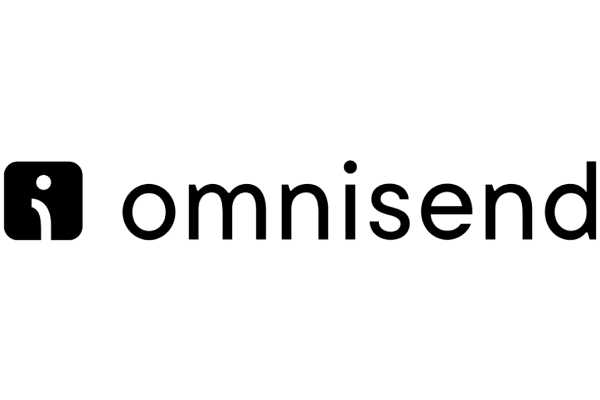
Pros:
✅ Omnichannel Capabilities: Email, SMS, push notifications, Messenger.
✅ Advanced Segmentation: Tailors campaigns to customer behavior.
✅ Machine Learning Recommendations: Personalizes product suggestions.
✅ E-commerce Integrations: Seamless with Shopify, BigCommerce, WooCommerce.
✅ Customizable Templates: Versatile drag-and-drop editor.
Cons:
❌ Higher Pricing: Costly for larger subscriber lists.
❌ Complex User Interface: Learning curve for beginners.
Best Email Marketing Tools for Small Businesses and Startups
Small businesses and startups often have limited resources and require an email marketing tool that is easy to use, affordable, and offers a wide range of features to support their growth. The ideal tool should provide a user-friendly interface, customizable templates, automation capabilities, and integrations with popular platforms.
Mailchimp: The All-in-One Marketing Platform
Mailchimp is a popular choice among small businesses and startups, thanks to its comprehensive feature set and affordable pricing. With Mailchimp, users can create visually appealing emails using the drag-and-drop editor and a variety of customizable templates. The platform offers a free plan that includes basic features and a monthly send limit of 10,000 emails, making it an attractive option for businesses just starting out.
One of Mailchimp’s strengths is its marketing automation capabilities, allowing users to create targeted campaigns based on subscriber behavior and preferences. The platform also offers advanced segmentation tools, enabling businesses to send personalized content to specific groups of subscribers. However, some users have reported deliverability issues, which could impact the effectiveness of their campaigns.
While Mailchimp is an excellent choice for small businesses and startups, its pricing can become costly as contact lists grow, and some users find the automation setup process to be complex. Despite these limitations, Mailchimp remains a top contender in the email marketing space, offering a balance of features, affordability, and ease of use.
Constant Contact: Simplicity and Reliability
Constant Contact is another popular email marketing tool that caters to small businesses and startups. The platform is known for its user-friendly interface, making it easy for beginners to create and send professional-looking emails. Constant Contact offers a wide selection of customizable templates and a drag-and-drop editor, allowing users to create engaging content quickly.
One of the standout features of Constant Contact is its excellent customer support, with users praising the responsive and helpful support team. The platform also boasts high email deliverability rates, ensuring that messages reach subscribers’ inboxes. Additionally, Constant Contact offers a comprehensive set of integrations, enabling businesses to connect with popular platforms like Salesforce, Shopify, and WordPress.
However, some users find Constant Contact’s pricing to be slightly higher compared to other tools in the market. The platform also lacks some advanced automation features found in other email marketing tools. Despite these limitations, Constant Contact remains a reliable choice for small businesses and startups prioritizing ease of use and exceptional customer support.
Drip: The E-commerce Powerhouse
Drip is an email marketing tool that focuses on serving the unique needs of e-commerce businesses. The platform offers advanced segmentation capabilities, allowing users to create targeted campaigns based on subscriber behavior, purchase history, and other custom data points. Drip’s automation tools are particularly powerful, enabling businesses to create complex workflows that drive sales and customer engagement.
One of Drip’s key advantages is its deep integration with popular e-commerce platforms like Shopify, WooCommerce, and Magento. This seamless integration allows businesses to easily sync customer data, automate abandoned cart emails, and personalize product recommendations. Drip also offers a wide range of customizable templates and a visual workflow builder, making it easy to create and manage campaigns.
However, Drip’s advanced features come with a learning curve, and some users may find the platform overwhelming initially. Additionally, Drip’s pricing is based on the number of contacts, which can become expensive for businesses with large subscriber lists. Despite these drawbacks, Drip remains an excellent choice for e-commerce businesses looking for advanced segmentation, personalization, and automation capabilities.
Best Email Marketing Tools for Personalization and Automation
Personalization and automation are crucial aspects of successful email marketing campaigns. Businesses looking to create targeted, relevant content that resonates with their audience should consider tools that offer advanced segmentation, dynamic content, and robust automation features.
ActiveCampaign: The Automation Powerhouse
ActiveCampaign is an email marketing tool that excels in marketing automation and personalization. The platform offers a visual automation builder, allowing users to create complex workflows based on subscriber behavior, preferences, and custom data points. ActiveCampaign’s automation capabilities are among the most advanced in the industry, enabling businesses to create highly targeted campaigns that drive engagement and conversions.
In addition to its automation features, ActiveCampaign offers powerful segmentation tools, allowing users to create dynamic segments based on a wide range of criteria. The platform also supports dynamic content, enabling businesses to personalize email content based on subscriber data. ActiveCampaign integrates with numerous third-party apps, making it easy to connect with other tools in your marketing stack.
However, ActiveCampaign’s advanced features come with a learning curve, and some users may find the interface overwhelming initially. The platform’s pricing is also higher compared to some other email marketing tools, which may be a concern for businesses with limited budgets. Despite these limitations, ActiveCampaign remains a top choice for businesses prioritizing automation and personalization.
Klaviyo: The E-commerce Specialist
Klaviyo is an email marketing tool designed specifically for e-commerce businesses. The platform offers advanced segmentation capabilities, allowing users to create targeted campaigns based on customer behavior, purchase history, and other e-commerce-specific data points. Klaviyo’s automation tools are particularly powerful, with pre-built workflows for common e-commerce scenarios like abandoned cart recovery and post-purchase follow-ups.
One of Klaviyo’s key strengths is its deep integration with popular e-commerce platforms like Shopify, Magento, and WooCommerce. This seamless integration enables businesses to easily sync customer data, automate personalized product recommendations, and track revenue attribution. Klaviyo also offers a wide range of customizable templates and a drag-and-drop editor, making it easy to create visually appealing emails.
However, Klaviyo’s pricing can be steep for businesses with large subscriber lists, as it is based on the number of contacts. Some users also find the platform’s learning curve to be steep, particularly when setting up advanced automations. Despite these drawbacks, Klaviyo remains an excellent choice for e-commerce businesses looking for advanced segmentation, personalization, and automation features tailored to their specific needs.
HubSpot: The All-in-One Marketing Suite
HubSpot is an all-in-one marketing suite that offers email marketing capabilities alongside a wide range of other tools, including CRM, marketing automation, and content management. The platform’s email marketing features include a drag-and-drop editor, customizable templates, and A/B testing capabilities. HubSpot’s automation tools are particularly powerful, allowing users to create complex workflows based on subscriber behavior and custom data points.
One of HubSpot’s key advantages is its seamless integration with the platform’s CRM and other marketing tools, enabling businesses to create a unified view of their customers and create highly targeted campaigns. The platform also offers advanced segmentation capabilities, dynamic content personalization, and detailed analytics to track campaign performance.
However, HubSpot’s pricing can be expensive, particularly for businesses that require access to multiple tools within the suite. Some users also find the platform’s learning curve to be steep, given the wide range of features and capabilities. Despite these limitations, HubSpot remains a powerful choice for businesses looking for an all-in-one marketing solution that includes robust email marketing and automation features.
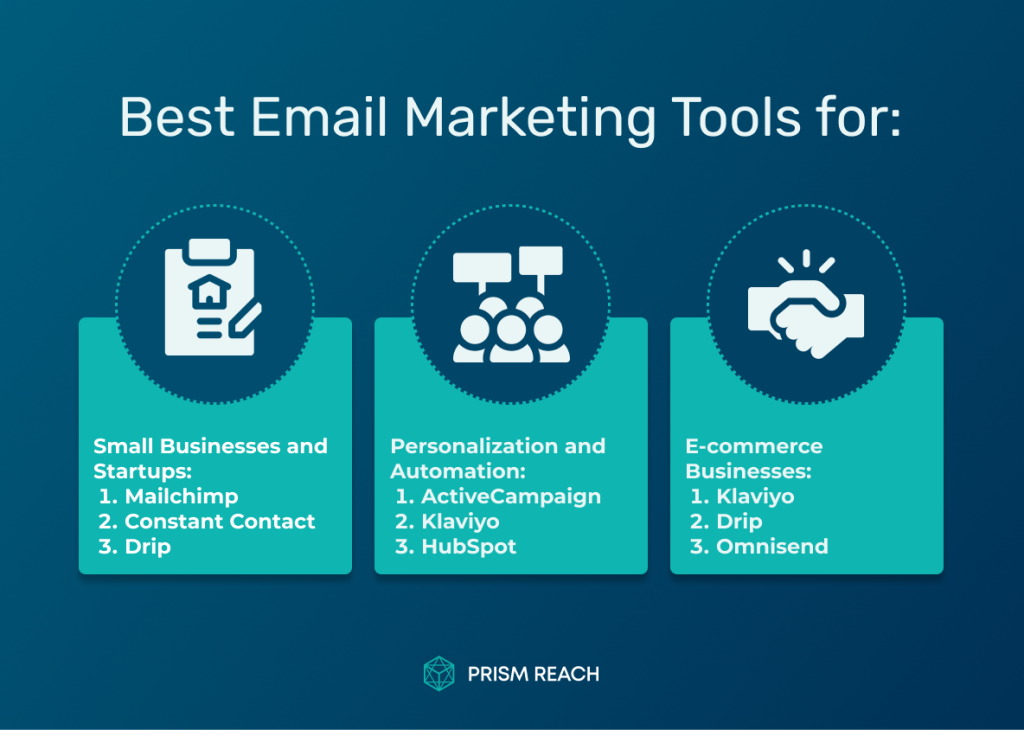
Best Email Marketing Tools for E-commerce Businesses
E-commerce businesses have unique email marketing needs, requiring tools that can integrate with their online stores, automate personalized product recommendations, and recover abandoned carts. The ideal email marketing tool for e-commerce should offer advanced segmentation capabilities, pre-built automation workflows, and deep integrations with popular e-commerce platforms.
Klaviyo: Tailored for E-commerce Success
As mentioned earlier, Klaviyo is an email marketing tool designed specifically for e-commerce businesses. The platform offers advanced segmentation capabilities, allowing users to create targeted campaigns based on customer behavior, purchase history, and other e-commerce-specific data points. Klaviyo’s pre-built automation workflows cover common e-commerce scenarios, such as abandoned cart recovery, post-purchase follow-ups, and personalized product recommendations.
One of Klaviyo’s key strengths is its deep integration with popular e-commerce platforms like Shopify, Magento, and WooCommerce. This seamless integration enables businesses to easily sync customer data, automate targeted campaigns, and track revenue attribution. Klaviyo also offers a wide range of customizable templates and a drag-and-drop editor, making it easy to create visually appealing emails that align with your brand.
However, Klaviyo’s pricing can be steep for businesses with large subscriber lists, as it is based on the number of contacts. Some users also find the platform’s learning curve to be steep, particularly when setting up advanced automations. Despite these drawbacks, Klaviyo remains a top choice for e-commerce businesses looking for an email marketing tool that offers advanced features tailored to their specific needs.
Drip: E-commerce Automation at Its Best
Drip is another email marketing tool that focuses on serving the unique needs of e-commerce businesses. The platform offers advanced segmentation capabilities, allowing users to create targeted campaigns based on subscriber behavior, purchase history, and custom data points. Drip’s automation tools are particularly powerful, enabling businesses to create complex workflows that drive sales and customer engagement.
One of Drip’s key advantages is its deep integration with popular e-commerce platforms like Shopify, WooCommerce, and Magento. This seamless integration allows businesses to easily sync customer data, automate abandoned cart emails, and personalize product recommendations. Drip also offers a wide range of customizable templates and a visual workflow builder, making it easy to create and manage campaigns.
However, Drip’s advanced features come with a learning curve, and some users may find the platform overwhelming initially. Additionally, Drip’s pricing is based on the number of contacts, which can become expensive for businesses with large subscriber lists. Despite these drawbacks, Drip remains an excellent choice for e-commerce businesses looking for advanced segmentation, personalization, and automation capabilities.
Omnisend: The Omnichannel Approach
Omnisend is an email marketing tool that offers an omnichannel approach to customer engagement. In addition to email marketing, the platform supports SMS, push notifications, and Facebook Messenger, allowing businesses to reach customers through their preferred channels. Omnisend offers advanced segmentation capabilities, pre-built automation workflows, and deep integrations with popular e-commerce platforms like Shopify, BigCommerce, and WooCommerce.
One of Omnisend’s standout features is its product recommendation engine, which uses machine learning to analyze customer behavior and generate personalized product suggestions. The platform also offers a wide range of customizable templates, a drag-and-drop editor, and A/B testing capabilities to optimize campaign performance.
However, some users find Omnisend’s pricing to be higher compared to other email marketing tools, particularly for businesses with large subscriber lists. The platform’s user interface may also take some time to get used to, especially for those new to email marketing. Despite these limitations, Omnisend remains a strong choice for e-commerce businesses looking for an omnichannel approach to customer engagement, with advanced features and integrations tailored to their needs.
Forbes
Email marketing is the most powerful tool you can use to build relationships with customers and clients.
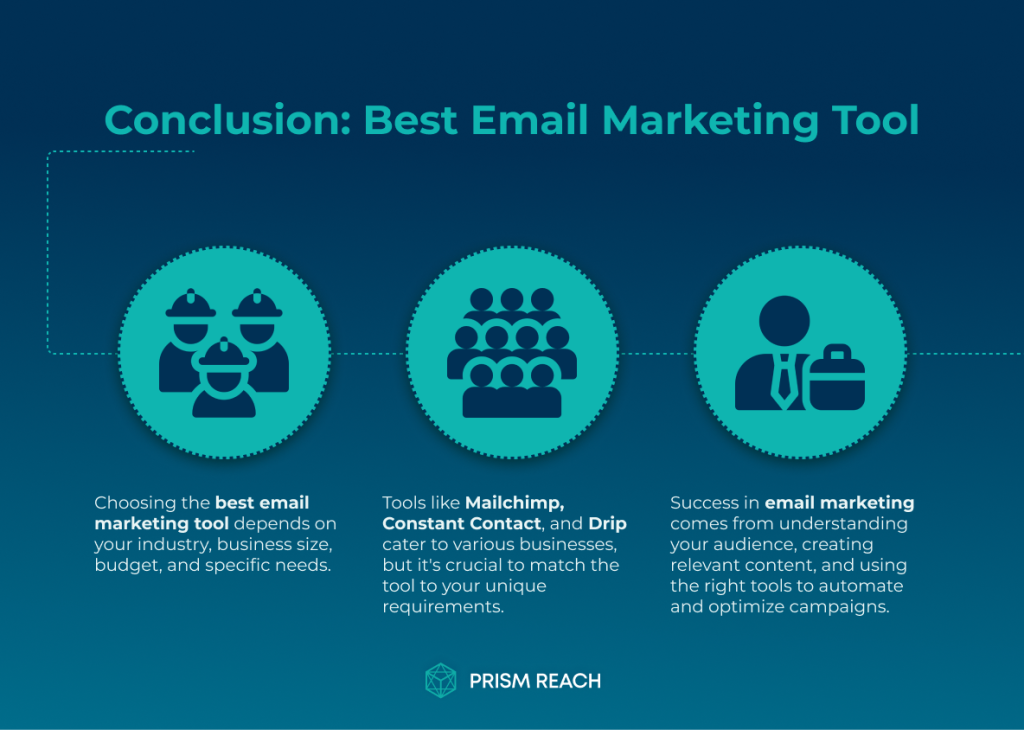
Conclusion
Choosing the best email marketing tool for your business depends on various factors, including your industry, business size, budget, and specific marketing needs. While tools like Mailchimp, Constant Contact, and Drip cater to a wide range of businesses, it’s essential to consider your unique requirements when making a decision.
For businesses looking for an AI-powered email marketing solution that offers personalization, customization, and easy integration, PrismReach.ai is an excellent choice. With its advanced features, user-friendly interface, and commitment to data privacy and security, PrismReach.ai helps businesses of all sizes create engaging, targeted campaigns that drive results.
Ultimately, the key to successful email marketing lies in understanding your audience, creating relevant content, and leveraging the right tools to automate and optimize your campaigns. By choosing a tool that aligns with your business goals and marketing strategy, you can unlock the power of email marketing and build lasting relationships with your customers.
Citations
- Mailchimp.
- Constant Contact.
- Klaviyo.
- ActiveCampaign.
- HubSpot.
- Omnisend.